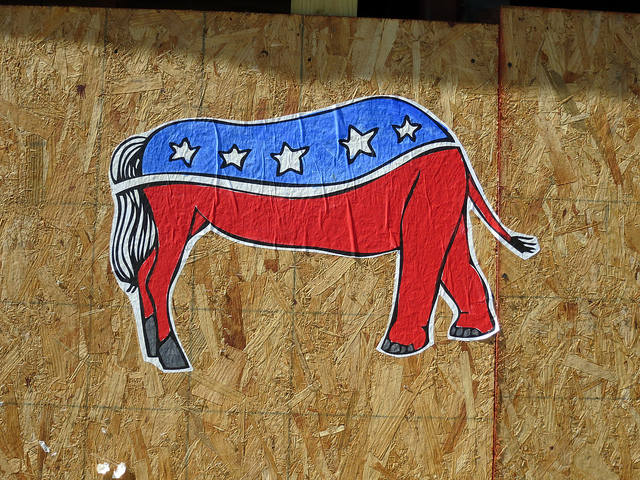During the Republican National Convention, a litany of speakers hectored Hillary Clinton for not using the specific phrase "radical Islamic terrorism." (This tendency has been shared not just by Obama but George W. Bush; here's why.) It was so repetitive, and has been for so long, that Scott Walker was able to get the crowd to chant it like a taunt to an opposing football team: "Radical! Islamic! Terrorism!"
This phrase-building has become more politically sophisticated of late, and it's the subject of a new working paper by Matthew Gentzkow, who won the Bates award for the best economist under 40 in 2014, when he was at the University of Chicago (I interviewed him at the time); he recently moved to Stanford. Teaming up with Jessie Shapiro, another young star economist recently of UChicago, and still-UChicago-employed econometrics professor Matt Taddy, they applied what has become a hallmark of Gentzkow's research to our current partisan era: using big data to take a quantitative look at what we think we know qualitatively.
Gentzkow and his co-authors looked at the partisanship of language that politicians use. Spoiler: they sure do sound more partisan:
From 1873 to the early 1990s, partisanship was roughly constant and fairly small in magnitude: in the 43rd session of Congress (1873-75), the probability of correctly guessing a speaker’s party based on a one-minute speech was 54 percent; by the 101st session (1989-1990) this figure had increased to 55 percent. Beginning with the congressional election of 1994, partisanship turned sharply upward, with the probability of guessing correctly based on a one-minute speech climbing to 83 percent by the 110th session (2007-09).
The internet and social media get a lot of blame for this, but they point the origins back further, which should be of little surprise to those who lived through it:
The inflection point in the partisanship series occurs in the 104th session (1995-1996), the first following the 1994 election. This election was a watershed event in the history of the US Congress. It brought a Republican majority to the House for the first time in more than forty years, and was the largest net partisan gain since 1948…. The Republicans were led by future Speaker of the House Newt Gingrich, who succeeded in uniting the party around a platform called the Contract with America. It specified the actions Republicans would take upon assuming control, focusing the contest around a set of national domestic issues including taxes, crime, and government efficiency.
The "contract" in and of itself was clever. Usually parties unite around a "platform," which, if you've followed the painfully inside-baseball art of crafting one, usually serves as a decent barometer of the people who care enough to show up at a political convention to argue their way through one. It's a decent thumbnail of a party's base, but easily enough ignored. So calling one a contract was, in its own way, a rhetorical advance that instantly benefited the GOP.
And then it was off to the races, fed by cable news, talk radio, and CSPAN:
We can use our data to look directly at the importance of the Contract with America in shaping congressional speech. We extract all phrases that appear in the text of the Contract and treat them as a single “topic,” computing both their frequency and their partisanship in each session. Figure 11 reports the results. As expected, the frequency of these phrases spikes in the 104th session (1995-1996). Their partisanship rises sharply in that year and continues to increase even as their frequency declines.
There are other measures to look at whether tangible partisanship has increased. What Gentzkow, Shapiro, and Taddy are looking at is partisan language. And while it has blown up in recent years, it hasn't done so equally. Some topics, perhaps surprisingly, aren't spoken of in historically partisan terms, at least within their data set, which consists mostly of Congressional speeches on the floor of the House and Senate. (Hence, the authors' focus on CSPAN, which has made politicians' floor rhetoric more accessible, for better and worse.)
Here's an interesting topic to start with, because it gives us a sense that the authors might be on to something—again, they used to test of whether you can guess a speaker's party by listening to speeches.

Seems about right: there's a lot of noise during the Progressive era and around Prohibition.
Here's another one in which partisanship was strongest in the past.

The prior peak coincides with anti-Communist fervor of the 1950s. The partisan tail at the end of their dataset might, in that context, seem chilling, but you haven't seen anything yet.

Politicians' rhetoric on immigration, by contrast, is off the charts, but there's more precedent for it.

One more topic has gone off the charts in recent years.

As with immigration, there were developments that would suggest increased rancor in the 1990s, when homicide rates reached near historic highs. They've declined since, but the partisanship surrounding it hasn't.
Interestingly enough, besides the above concepts, a few other issues see upticks in partisanship—business, education, religion, trade, and health—though not nearly as dramatic as they're seeing today. This is another potential value in the economists' work: not just telling us what we know about our own era, but investigating things we might not realize about the past.
The postwar period, for example, is popularly considered a moment of comparative peace and calm in America's history, but their data suggest a more subtle version of our own time. Make America great again, indeed.




